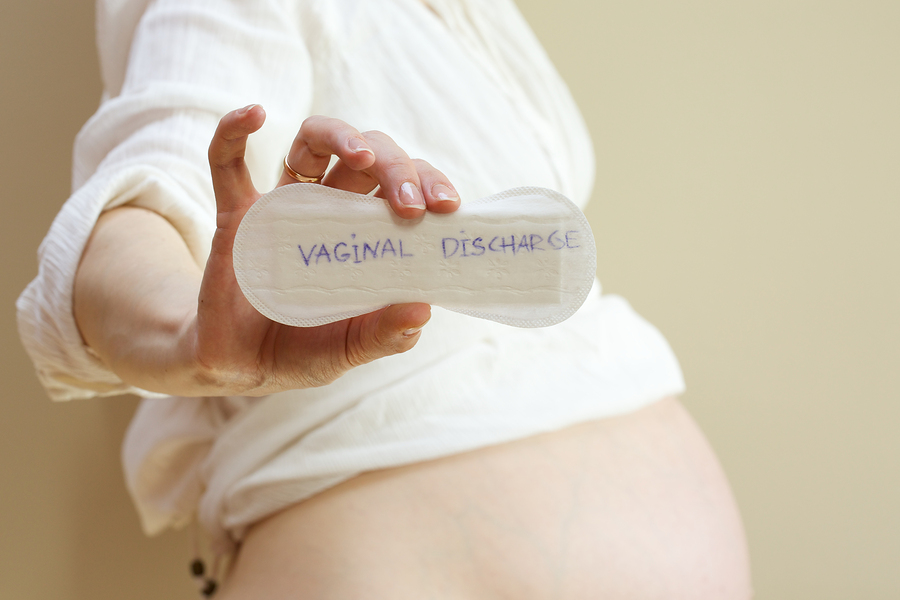Early Pregnancy Discharge
Early pregnancy discharge happens for a couple reasons that are normal and nothing to be concerned about. Here we will talk about early pregnancy discharge that is completely normal as well as discharge that is a cause of concern.
Normal Early Pregnancy Discharge

Early in your pregnancy, you may notice an increase in the in the normal milky-white fluid you have always noticed in your panties between periods. As always, this fluid is important to keep infections from forming in your vagina. Increases in this fluid, called Leukorrhea, is caused by your increasing estrogen levels.
Increased estrogen causes more blood flow to your pelvic area and stimulates your mucus membranes. All of this is very important as your body prepares for childbirth. Leukorrhea should be milky-white or cream colored and virtually odorless.
If you notice a pink or slightly brownish tint to the normal white Leukorrhea that is also virtually odorless, you may be noticing slight spotting or bleeding. This is also normal, especially after you have sex while you are pregnant.
Get all of our best pregnancy tips. Download our free e-guide today!
Learn how to avoid Gaining too much weight, strategies for Avoiding gestational diabetes and secrets for an easy delivery.
The increased blood and sensitivity of your mucus membranes make it easier for them to bleed slightly after being rubbed. You may also notice your gums bleeding a little for the same reason after you brush your teeth.
There are a couple more reasons you may notice blood in your discharge. Very early on in your pregnancy (usually before you even know you are pregnant) spotting can be caused by implantation when embryo attaches to your uterine wall.
Later on in your pregnancy, a mucus plug develops at the top of your cervix. This mucus plug protects the cervical opening and isolates the uterus from the vagina to prevent infections while you are pregnant. While it is developing, a little blood my be released.
Early Pregnancy Discharge to be Concerned About
If you have smelly discharge or lumpy discharge it may indicate an infection. Smelly yellow, gray or green discharge is a cause of concern. You need to see your doctor or midwife right away.
More about Yellow Early Pregnancy Discharge
Yellow discharge that is “bumpy”, “granular”, “tapioca-like” that smells like yeast (like fresh bread) or otherwise has a distinct odor often indicates you have yeast over-growth. Other symptoms include intense itching, swelling and irritation.
Often caused by too much sugar or simple carbohydrates in your diet, particularly if you also have athletes foot or jock itch at the same time, yellow granular discharge can be an indication that your body may be having trouble regulating your blood sugar properly. Read more about managing blood sugar during pregnancy.
Changing pregnancy hormones can also destabilize the delicate balance in your vagina and cause yeast overgrowth. To treat it you should speak to your doctor or midwife to confirm that the problem is indeed yeast and not bacteria or another organism. They will also be able to determine which medicine is safest.
If the problem is yeast, a really good way to prevent the infection from reoccurring your entire pregnancy is to limit your consumption of sugar and simple carbohydrates. For more information about this read about our healthy pregnancy diet.
More about Grayish Early Pregnancy Discharge
For some women, often those who have been on oral antibiotics recently, vaginal discharge that is either yeast OR bacterial in nature is more common.
Bacterial vaginosis is a type of vaginal inflammation that results from the overgrowth of one of several types of bacteria normally present in the vagina, upsetting the natural balance of vaginal bacteria. Normal pregnancy hormones will sometimes upset the natural balance, but antibiotics are the more likely culprit if you have not had new sexual partners.
Bacterial vaginosis signs and symptoms may include vaginal discharge that's thin and grayish white. The discharge is usually foul-smelling with a fishy odor. Itching and burning during urination are also signs.
Need to Talk To Someone?
Do be very specific or personal questions you do not feel comfortable discussing in public forums? If so, please meet signing up for a 60 minute mentoring session.
Pregnancy & Childbirth Mentoring
You will be amazed at the Amount of information and can gain confidence in just a few minutes of one-on-one help.
Whether the problem is yeast overgrowth or bacterial overgrowth, the problem is most likely not isolated to your vagina. Although most obstetricians focus on just your vagina, often you have the same problem in your digestive system and intestinal tract. Basically, the balance of good bacteria and yeasts to bad bacteria and yeast has been upset.
There are loads of antibiotics in conventionally produced beef and chicken as well as estrogen (estrogen is encourages animals to put on fat / weight), so if you haven’t been eating primarily organic, free range and wild caught food, you may also have an imbalance due to diet alone.
The best way we have found to solve this problem and improve your gut health is to eat only free-range and organic food while pregnant at the same time we lower our carbohydrate intake and increase our consumption of naturally fermented (sauerkraut, pickles, kimchee) and probiotic (plain yogurt and kephir) foods. Read more about what to eat and why while you are pregnant.
This will help improve your chances of having healthy discharge during your pregnancy at the same time you avoid developing gestational diabetes and repeat yeast or bacterial infections.
More about Green Early Pregnancy Discharge
The most common cause of green vaginal discharge is a sexually transmitted infection known as trichomoniasis. One of the most commonly transfered sexual diseases, it is caused by a parasite. The discharge often has a foul odor and is typically more yellowish-green than pure green. Intercourse and urination may cause discomfort, and the genital area may be itchy.
The symptoms of trichomoniasis vary from person to person. In fact, up to 50% of women who develop the infection (90% of infected men) have no symptoms at all. Therefore, you may have had a trichomoniasis infection for a while and not even realized it. Once you are pregnant, changes in immunity and hormone balances may allow the trichomoniasis to reproduce more, causing you to experience your first symptoms. Trich effects more than 125,000 pregnant women per year.
If you suspect you have Trichomoniasis, it is very important that you talk to your doctor or midwife. If left untreated, trichomoniasis can increase the risk of having your water break prematurely or having a preterm birth. Babies born to women with trichomoniasis rarely contract the infection, but they can develop a fever after birth.
Trichomoniasis can easily be diagnosed by sampling your discharge. At the same time tests for other infections, including yeast and bacterial vaginosis, may be performed at the same time. Trichomoniasis and bacterial vaginosis are curable with appropriate antibiotic therapy. Yeast infections require a different approach.
What to do if your early pregnancy discharge is especially heavy or bothersome
Ideally you do nothing if you have normal early pregnancy discharge.
If your discharge is especially heavy you could consider using a pantie liner to absorb it, however a pantie liner can also irritate your labia (lips) or the mucus membranes around your vaginal opening.
So the best course to prevent infection is to wear comfortable, breathable cotton panties and simply change into a new pantie midday if you feel your discharge is too thick or you are not happy with simply wiping the discharge off of your panties when you go to the bathroom.
Never wear a tampon while you are pregnant or insert anything into your vagina without first speaking to your doctor or midwife. That may lead to vaginal infection, exactly what the release of the natural milky white fluid is working to prevent.
Douching is a very bad idea because it will upset the natural chemistry in your vagina and can lead to infection or worse yet, force air into your vagina - which is dangerous when you are pregnant.
We also suggest that you only use mild soap and water to wash your entire crotch area. The use of prepared wipes or prepared washes meant to keep your vaginal area clean or stop odor is both irritating to your extra sensitive mucus membranes and can change the pH in your genital tract (vagina) - all of which may cause infection.
Get your top pregnancy questions answered
- Learn what you should eat while you are pregnant so you don’t gain too much weight
- Learn more about gestational diabetes
- Post a question on our pregnancy forum
Have A Great Story or a Burning Question About Pregnancy?
Do you have a great story about this? Share it!
Have a question? Ask it!











New! Facebook Comments
Tell us what you think!